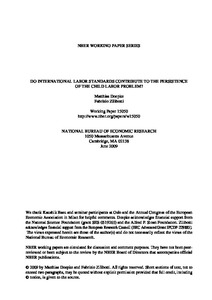Do international labor standards contribute to the persistence of the child labor problems?
"In recent years, a number of governments and consumer groups in rich countries have tried to discourage the use of child labor in poor countries through measures such as product boycotts and the imposition of international labor standards. The purported objective of such measures is to reduce...
| Main Authors: | , , |
|---|---|
| Institution: | ETUI-European Trade Union Institute |
| Format: | TEXT |
| Language: | English |
| Published: |
Cambridge, MA
2009
NBER |
| Subjects: | |
| Online Access: | https://www.labourline.org/KENTIKA-19188979124919061519-Do-international-labor-standar.htm |
| Summary: | "In recent years, a number of governments and consumer groups in rich countries have tried to discourage the use of child labor in poor countries through measures such as product boycotts and the imposition of international labor standards. The purported objective of such measures is to reduce the incidence of child labor in developing countries and thereby improve children's welfare. In this paper, we examine the effects of such policies from a political-economy perspective. We show that these types of international action on child labor tend to lower domestic political support within developing countries for banning child labor. Hence, international labor standards and product boycotts may delay the ultimate eradication of child labor." |
|---|---|
| Physical Description: | 39 p. Digital |

